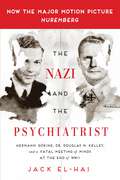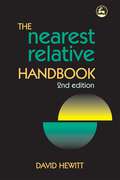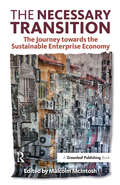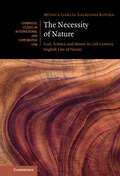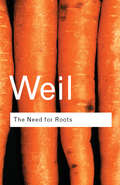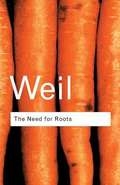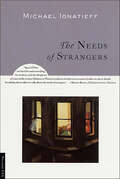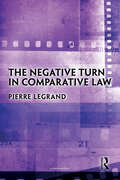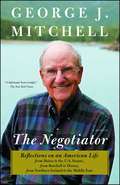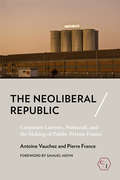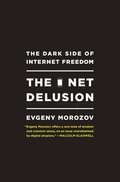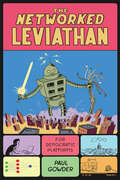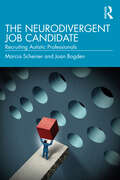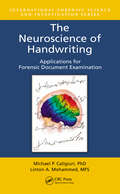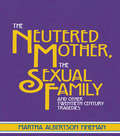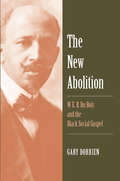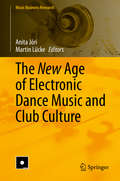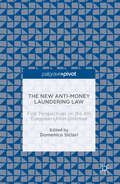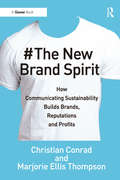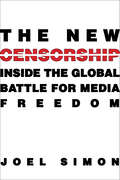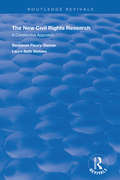- Table View
- List View
The Nazi and the Psychiatrist: Hermann Göring, Dr. Douglas M. Kelley, and a Fatal Meeting of Minds at the End of WWII
by Jack El-HaiNOW THE MAJOR MOTION PICTURE NUREMBERGIn 1945, an improbable relationship between the fallen Reichsmarschall, Hermann Goering, and ambitious US Army physician, Douglas Kelley, becomes a hazardous quest into the nature of evil, amid the devastation of Europe at the end of World War II In 1945, after his capture at the end of the Second World War, Hermann Göring arrived at an American-run detention center in war-torn Luxembourg, accompanied by sixteen suitcases and a red hatbox. Joining him in the detention center were fifty-one senior Nazis, of whom Göring was the dominant figure. To ensure that the captives were fit for trial at Nuremberg, the US army sent an ambitious army psychiatrist, Captain Douglas M. Kelley, to supervise and evaluate them. To Kelley, it was the professional opportunity of a lifetime: to discover a distinguishing trait among these arch-criminals that would mark them as psychologically different from the rest of humanity. But Kelley&’s quest would prove to be a dangerous one. The more he spoke with the Nazi captives, the more he began to understand and appreciate their perspective—and the more he would fall for their charms.
The Nearest Relative Handbook: Second Edition
by David HewittWhen a person is subject to the Mental Health Act, many of his or her principal rights are taken away. It is the function of the nearest relative to compensate for that loss. This fully updated second edition explains how the nearest relative is identified, and how in some cases he or she might be displaced. It also contains a wealth of new case examples and illustrative scenarios, providing a succinct discussion of each significant case and incorporating all the very latest changes to the Mental Health Act. The Nearest Relative Handbook will be an invaluable aid to those who find themselves in a professional relationship with a nearest relative, to those who are or wish to be a nearest relative and to anyone needing to make sense of the relevant statutory provisions.
The Necessary Transition: The Journey towards the Sustainable Enterprise Economy
by Malcolm McIntoshLife on Earth for humanity and our ecosystems is at a point of great change. There is much to be learnt about previous great disruptions. The key words are *adaptation* and *transformation*. Most international companies operate across multiple social and environmental geographies, so they know this intellectual and practical landscape. And for many governments the challenges of social and environmental justice are also paramount – not least because equitable societies are best for business, and best for human well-being.The Necessary Transition addresses the many transitions taking place around the world: from high- to low-carbon economies, from gross inequality to egalitarianism, from massive human rights abuses to socially just societies, and from high corruption to societies with high social cohesion and integrity.The book brings together leading international researchers and practitioners to share their knowledge and expertise, and offers answers to many of the pressing questions that must be addressed in the journey towards a sustainable enterprise economy – an absolutely necessary transition for humanity.Contributors include: Sara Parkin, Founder-Director and Trustee of the UK's Forum for the Future; Bill Champion, Managing Director, Rio Tinto Coal Australia; and Mark Swilling, co-author of "Just Transitions" and Academic Director of the Sustainability Institute, South Africa.The key question is: "Is a transition to a sustainable future possible within the logic of conventional capitalism and 20th-century models of development?" This book provides radical perspectives from varying entry points and is essential reading for academics and practitioners interested in how we plan, speed and scale such necessary transitions.
The Necessity of Nature: God, Science and Money in 17th Century English Law of Nature (Cambridge Studies in International and Comparative Law)
by Mónica García-Salmones RoviraTo understand our current world crises, it is essential to study the origins of the systems and institutions we now take for granted. This book takes a novel approach to charting intellectual, scientific and philosophical histories alongside the development of the international legal order by studying the philosophy and theology of the Scientific Revolution and its impact on European natural law, political liberalism and political economy. Starting from analysis of the work of Thomas Hobbes, Robert Boyle and John Locke on natural law, the author incorporates a holistic approach that encompasses global legal matters beyond the foundational matters of treaties and diplomacy. The monograph promotes a sustainable transformation of international law in the context of related philosophy, history and theology. Tackling issues such as nature, money, necessities, human nature, secularism and epistemology, which underlie natural lawyers' thinking, Associate Professor García-Salmones explains their enduring relevance for international legal studies today.
The Need for Roots: Prelude to a Declaration of Duties Towards Mankind (Routledge Classics)
by Simone WeilHailed by Andre Gide as the patron saint of all outsiders, Simone Weil's short life was ample testimony to her beliefs. In 1942 she fled France along with her family, going firstly to America. She then moved back to London in order to work with de Gaulle. Published posthumously The Need for Roots was a direct result of this collaboration. Its purpose was to help rebuild France after the war. In this, her most famous book, Weil reflects on the importance of religious and political social structures in the life of the individual. She wrote that one of the basic obligations we have as human beings is to not let another suffer from hunger. Equally as important, however, is our duty towards our community: we may have declared various human rights, but we have overlooked the obligations and this has left us self-righteous and rootless. She could easily have been issuing a direct warning to us today, the citizens of Century 21.
The Need for Roots: Prelude to a Declaration of Duties towards Mankind
by Simone Weil Arthur WillisHailed by Andre Gide as the patron saint of all outsiders, Simone Weil's short life was ample testimony to her beliefs. In 1942 she fled France along with her family, going firstly to America. She then moved back to London in order to work with de Gaulle. Published posthumously The Need for Rootswas a direct result of this collaboration. Its purpose was to help rebuild France after the war. In this, her most famous book, Weil reflects on the importance of religious and political social structures in the life of the individual. She wrote that one of the basic obligations we have as human beings is to not let another suffer from hunger. Equally as important, however, is our duty towards our community: we may have declared various human rights, but we have overlooked the obligations and this has left us self-righteous and rootless. She could easily have been issuing a direct warning to us today, the citizens of Century 21.
The Need for Roots: Prelude to a Declaration of Obligations towards the Human Being (Routledge Classics Ser.)
by Simone WeilA new translation of Simone Weil's best-known work: a political, philosophical and spiritual treatise on what human life could beWhat do humans require to be truly nourished? Simone Weil, one of the foremost philosophers of the last century, envisaged us all as being bound by unconditional, eternal obligations towards every other human being. In The Need for Roots, her most famous work, she argued that our greatest need was to be rooted: in a community, a place, a shared past and collective future hopes. Written for the Free French movement while she was exiled in London during the Second World War, Weil's visionary combination of philosophy, politics and mysticism is her answer to the question of what life without occupation - and oppression - might be.'The patron saint of all outsiders' Andre Gide'The only great spirit of our time' Albert Camus Translated by Ros Schwartz, with an introduction by Kate Kirkpatrick.
The Needs of Strangers
by Michael IgnatieffThis thought provoking book uncovers a crisis in the political imagination, a wide-spread failure to provide the passionate sense of community "in which our need for belonging can be met." Seeking the answers to fundamental questions, Michael Ignatieff writes vividly both about ideas and about the people who tried to live by them-from Augustine to Bosch, from Rousseau to Simone Weil. Incisive and moving, The Needs of Strangers returns philosophy to its proper place, as a guide to the art of being human.
The Negative Turn in Comparative Law
by Pierre LegrandThis book’s essays aim subversively and resolutely to replace the hegemonic discursive frame governing comparative law. Beyond harnessing negative critique to resist the orthodoxy’s self-assured cognitive assumptions, at once unexamined and indefensible, the argument mobilizes negativity as an empowering idea, a resource towards the displacement of the brand of comparative law that has been fostering a closing of the comparing mind. To answer the demands of the moment and herald foreign law research as a creditable intellectual development, one requires to engage in a culturalist theorization and practice of comparative law at radical variance from the prevailing positivist model. The negative turn, then, is a call to comparative action – a comparactive motion – in support of the robustly indisciplined thinking that must thoroughly inform research into foreign law. In photography, the negative has been employed productively to generate a positive print. In comparative law, negation wants to affirm edifying epistemic yields.This book will benefit all law teachers and postgraduate law students interested in the workings of law on the international scene, whether specialists in comparative law, public international law, private international law, transnational law, or foreign relations law – in particular, individuals bringing to bear a critical inclination to their subject-matter.
The Negotiable Constitution
by Grégoire C. N. WebberIn matters of rights, constitutions tend to avoid settling controversies. With few exceptions, rights are formulated in open-ended language, seeking consensus on an abstraction without purporting to resolve the many moral-political questions implicated by rights. The resulting view has been that rights extend everywhere but are everywhere infringed by legislation seeking to resolve the very moral-political questions the constitution seeks to avoid. The Negotiable Constitution challenges this view. Arguing that underspecified rights call for greater specification, Grégoire C. N. Webber draws on limitation clauses common to most bills of rights to develop a new understanding of the relationship between rights and legislation. The legislature is situated as a key constitutional actor tasked with completing the specification of constitutional rights. In turn, because the constitutional project is incomplete with regards to rights, it is open to being re-negotiated by legislation struggling with the very moral-political questions left underdetermined at the constitutional level.
The Negotiator: A Memoir
by George J. MitchellCompelling, poignant, enlightening stories from former Senate Majority Leader George Mitchell about growing up in Maine, his years in the Senate, working to bring peace to Northern Ireland and the Middle East, and what he’s learned about the art of negotiation during every stage of his life.It’s a classic story of the American Dream. George Mitchell grew up in a working class family in Maine, experiencing firsthand the demoralizing effects of unemployment when his father was laid off from a lifelong job. But education was always a household priority, and Mitchell embraced every opportunity that came his way, eventually becoming the ranking Democrat in the Senate during the administrations of George H.W. Bush and Bill Clinton. Told with wit, frankness, and a style all his own, Senator Mitchell’s memoir reveals many insights into the art of negotiation. Mitchell looks back at his adventures in law and politics—including instrumental work on clean air and water legislation, the Iran-Contra hearings, and healthcare reform—as well as life after the Senate, from leading the successful Northern Ireland peace process, to serving as chairman of The Walt Disney Company, to heading investigations into the use of steroids in baseball and unethical activity surrounding the Olympic Games. Through it all, Senator Mitchell’s incredible stories—some hilarious, others tragic, all revealing—offer invaluable insights into critical moments in the last half-century of business, law, and politics, both domestic and international.
The Neoliberal Republic: Corporate Lawyers, Statecraft, and the Making of Public-Private France (Corpus Juris: The Humanities in Politics and Law)
by Antoine Vauchez Pierre FranceThe Neoliberal Republic traces the corrosive effects of the revolving door between public service and private enrichment on the French state and its ability to govern and regulate the private sector. Casting a piercing light on this circulation of influence among corporate lawyers and others in the French power elite, Antoine Vauchez and Pierre France analyze how this dynamic, a feature of all Western democracies, has developed in concert with the rise of neoliberalism over the past three decades. Based on interviews with dozens of public officials in France and a unique biographical database of more than 200 civil-servants-turned-corporate-lawyers, The Neoliberal Republic explores how the always-blurred boundary between public service and private interests has been critically compromised, enabling the transformation of the regulatory state into either an ineffectual bystander or an active collaborator in the privatization of public welfare. The cumulative effect of these developments, the authors reveal, undermines democratic citizenship and the capacity to imagine the public good.
The Net Delusion
by Evgeny Morozov"The revolution will be Twittered!" declared journalist Andrew Sullivan after protests erupted in Iran in June 2009. Yet for all the talk about the democratizing power of the Internet, regimes in Iran and China are as stable and repressive as ever. In fact, authoritarian governments are effectively using the Internet to suppress free speech, hone their surveillance techniques, disseminate cutting-edge propaganda, and pacify their populations with digital entertainment. Could the recent Western obsession with promoting democracy by digital means backfire? In this spirited book, journalist and social commentator Evgeny Morozov shows that by falling for the supposedly democratizing nature of the Internet, Western do-gooders may have missed how it also entrenches dictators, threatens dissidents, and makes it harder--not easier--to promote democracy. Buzzwords like "21st-century statecraft" sound good in PowerPoint presentations, but the reality is that "digital diplomacy" requires just as much oversight and consideration as any other kind of diplomacy. Marshaling compelling evidence, Morozov shows why we must stop thinking of the Internet and social media as inherently liberating and why ambitious and seemingly noble initiatives like the promotion of "Internet freedom" might have disastrous implications for the future of democracy as a whole.
The Networked Leviathan: For Democratic Platforms
by Paul GowderGovernments and consumers expect internet platform companies to regulate their users to prevent fraud, stop misinformation, and avoid violence. Yet, so far, they've failed to do so. The inability of platforms like Facebook, Google, and Amazon to govern their users has led to stolen elections, refused vaccines, counterfeit N95s in a pandemic, and even genocide. Such failures stem from these companies' inability to manage the complexity of their userbases, products, and their own incentives under the eyes of internal and external constituencies. The Networked Leviathan argues that countries should adapt the institutional tools developed in political science for platform governance to democratize major platforms. Democratic institutions allow knowledgeable actors to freely share and apply their understanding of the problems they face while leaders more readily recruit third parties to help manage their decision-making capacity. This book is also available Open Access on Cambridge Core. For more information, visit https://networked-leviathan.com.
The Neurodivergent Job Candidate: Recruiting Autistic Professionals
by Joan Bogden Marcia ScheinerThis book provides guidance on recruiting, interviewing, and onboarding practices that will allow employers to successfully hire neurodivergent professionals into inclusive, competitive employment. Today, 35% of 18-year-olds with an autism spectrum diagnosis attend college, yet they have a 75–85% under-employment and unemployment rate after graduation. While organizations are looking to expand their diversity and inclusion hiring efforts to include neurodivergent professionals, current recruiting and interviewing practices in general are not well-suited to this. With over one-third of the US population identifying as neurodivergent, employers need to address how to attract this talent pool to take advantage of a meaningful segment of the workforce. Readers of this book will gain an understanding of how to guide their organizations through the creation of recruiting, interviewing, and onboarding processes tailored to neurodivergent professionals in any field. Written by authors with extensive experience working in the corporate world and consulting with Fortune 1000 companies on autism hiring efforts, this book is targeted at employers, acknowledging their perspective. Structured as a reference guide for busy recruiters, hiring managers, and supervisors, this book can be read in its entirety, in relevant sections as needed, or used as a refresher whenever necessary. This book also provides a background on the thinking styles of autistic individuals, giving the reader a deeper understanding of how to best support neurodivergent jobseekers.
The Neuroscience of Handwriting: Applications for Forensic Document Examination (International Forensic Science And Investigation Ser.)
by Michael P. Caligiuri Linton A. MohammedThe Daubert trilogy of U.S. Supreme Court cases has established that scientific expert testimony must be based on science grounded in empirical research. As such, greater scrutiny is being placed on questioned document examination generally, and handwriting comparison in particular. Bridging the gap between theory and practice, The Neuroscience of
The Neutered Mother, The Sexual Family and Other Twentieth Century Tragedies
by Martha Albertson FinemanCalling for nothing less than a radical reform of family law and a reconception of intimacy, The Neutered Mother, The Sexual Family, and Other Twentieth Century Tragedies argues strongly against current legal and social policy discussions about the family because they do not have at their core the crucial concepts of caregiving and dependency, as well as the best interests of women and children. The Neutered Mother scrutinizes the definitions of family and mother throughout the volume while paying close attention to issues of race, class and sexuality. In addition, Fienman convincingly contests society's refusal to dignify, support and respond to the needs of caregivers and illustrates the burden they must bear due to this treatment. This book is a crucial step toward defining America's most pressing social policy problems having to do with women, motherhood and the family.
The New Abolition
by Gary DorrienThe black social gospel emerged from the trauma of Reconstruction to ask what a "new abolition" would require in American society. It became an important tradition of religious thought and resistance, helping to create an alternative public sphere of excluded voices and providing the intellectual underpinnings of the civil rights movement. This tradition has been seriously overlooked, despite its immense legacy. In this groundbreaking work, Gary Dorrien describes the early history of the black social gospel from its nineteenth-century founding to its close association in the twentieth century with W. E. B. Du Bois. He offers a new perspective on modern Christianity and the civil rights era by delineating the tradition of social justice theology and activism that led to Martin Luther King Jr. "
The New Age of Electronic Dance Music and Club Culture (Music Business Research)
by Martin Lücke Anita JóriThis book offers a comprehensive overview of electronic dance music (EDM) and club culture. To do so, it interlinks a broad range of disciplines, revealing their (at times vastly) differing standpoints on the same subject. Scholars from such diverse fields as cultural studies, economics, linguistics, media studies, musicology, philosophy, and sociology share their perspectives. In addition, the book features articles by practitioners who have been active on the EDM scene for many years and discuss issues like gender and diversity problems in general, and the effects of gentrification on club culture in Berlin. Although the book’s main focus is on Berlin, one of the key centers of EDM and club culture, its findings can also be applied to other hotspots. Though primarily intended for researchers and students, the book will benefit all readers interested in obtaining an interdisciplinary overview of research on electronic dance music.
The New Anti-Money Laundering Law
by Domenico SiclariThis book introduces andcontextualizes the revised and strengthened legislation on the laundering ofcriminal funds mandated by the European Union on the 20th May 2015. The authors provide fresh and new insight into the EU's fourth directive2015/849, with a specific focus on topics such as: beneficial ownership andeffective transparency, the risk-based approach, the issue of supervision ofpayment institutions that operate across borders by agents, the new method ofrisk assessment, tax crimes inclusion in "criminal activity" definition, andthe effects of new rules on the gambling sector. The authors present the newlaws in the context of their legal genealogy and demonstrate the benefits theybring in raising the standards for anti-money laundering regulation andcounter-terrorism financing. The book's comprehensiveexploration of this new legislation will appeal to policy-makers, students andacademics hoping to understand the changes more clearly.
The New Brand Spirit: How Communicating Sustainability Builds Brands, Reputations and Profits
by Christian Conrad Marjorie Ellis ThompsonEffective sustainability communication can deliver business value. Get it wrong, however, and the reputational damage will be costly. Stakeholders, and the general public as well as activists, are unforgiving of companies whose products, services, business practices or culture fall short of their socially responsible rhetoric. Based on close to one hundred in-depth interviews with leading experts, Christian Conrad and Marjorie Thompson's The New Brand Spirit helps corporate communications and marketing professionals tackle this conundrum by providing a first-hand view of eight distinct and relevant stakeholder perspectives. Nineteen comprehensive and well-researched best practice cases from sustainability leaders like IBM, Unilever, Marks & Spencer and Puma will inspire all those tasked with communicating sustainability with practical and applicable tools and lessons learned. The result is a book that will enable senior executives, corporate communication professionals and brand managers to decide when, to whom and how to communicate sustainability related messages - and when not to.
The New Censorship: Inside the Global Battle for Media Freedom (Columbia Journalism Review Books)
by Joel SimonJournalists are being imprisoned and killed in record numbers. Online surveillance is annihilating privacy, and the Internet can be brought under government control at any time. Joel Simon, the executive director of the Committee to Protect Journalists, warns that we can no longer assume that our global information ecosystem is stable, protected, and robust. Journalists are increasingly vulnerable to attack by authoritarian governments, militants, criminals, and terrorists, who all seek to use technology, political pressure, and violence to set the global information agenda.Reporting from Pakistan, Russia, Turkey, Egypt, and Mexico, among other hotspots, Simon finds journalists under threat from all sides. The result is a growing crisis in information—a shortage of the news we need to make sense of our globalized world and fight human rights abuses, manage conflict, and promote accountability. Drawing on his experience defending journalists on the front lines, he calls on "global citizens," U.S. policy makers, international law advocates, and human rights groups to create a global freedom-of-expression agenda tied to trade, climate, and other major negotiations. He proposes ten key priorities, including combating the murder of journalists, ending censorship, and developing a global free-expression charter to challenge the criminal and corrupt forces that seek to manipulate the world's news.
The New Censorship: Inside the Global Battle for Media Freedom (Columbia Journalism Review)
by Joel SimonAn examination of how the media is under fire and how to safeguard journalists and the information they seek to share with the public.Journalists are being imprisoned and killed in record numbers. Online surveillance is annihilating privacy, and the Internet can be brought under government control at any time. Joel Simon, the executive director of the Committee to Protect Journalists, warns that we can no longer assume that our global information ecosystem is stable, protected, and robust. Journalists are increasingly vulnerable to attack by authoritarian governments, militants, criminals, and terrorists, who all seek to use technology, political pressure, and violence to set the global information agenda.Reporting from Pakistan, Russia, Turkey, Egypt, and Mexico, among other hotspots, Simon finds journalists under threat from all sides. The result is a growing crisis in information—a shortage of the news we need to make sense of our globalized world and fight human rights abuses, manage conflict, and promote accountability. Drawing on his experience defending journalists on the front lines, he calls on &“global citizens,&” U.S. policy makers, international law advocates, and human rights groups to create a global freedom-of-expression agenda tied to trade, climate, and other major negotiations. He proposes ten key priorities, including combating the murder of journalists, ending censorship, and developing a global free-expression charter to challenge the criminal and corrupt forces that seek to manipulate the world's news.&“Wise and insightful. [Simon] offers hope to all who care about maintaining the free flow of information in a world full of would-be censors.&”—Ann Cooper, Columbia Journalism School
The New Civil Rights Research: A Constitutive Approach (Routledge Revivals)
by Laura Beth NielsenFirst published in 2006, this book brings together some of the most innovative and important research on civil rights law and legality, this book draws on narratives of individuals from a variety of contexts to provide a rich and contextualized understanding of what happens when law interacts with other competing systems or forms of social organization. By privileging the real world experiences of those most influenced by rights, the collection moves beyond the traditional polarizing debates and presents a constitutive approach to rights that is not reducible to a simple 'for or against' rights formula. While this complex consciousness approach often contributes to the reproduction of dominant-subordinate social relations, it also allows for spaces of resisting existing hierarchical structures embedded in various law-related sites.
The New Commonwealth Model of Constitutionalism
by Stephen GardbaumStephen Gardbaum argues that recent bills of rights in Canada, New Zealand, the United Kingdom and Australia are an experiment in a new third way of organizing basic institutional arrangements in a democracy. This 'new Commonwealth model of constitutionalism' promises both an alternative to the conventional dichotomy of legislative versus judicial supremacy and innovative techniques for protecting rights. As such, it is an intriguing and important development in constitutional design of relevance to drafters of bills of rights everywhere. In developing the theory and exploring the practice of this new model, the book analyses its novelty and normative appeal as a third general model of constitutionalism before presenting individual and comparative assessments of the operational stability, distinctness and success of its different versions in the various jurisdictions. It closes by proposing a set of general and specific reforms aimed at enhancing these practical outcomes.
